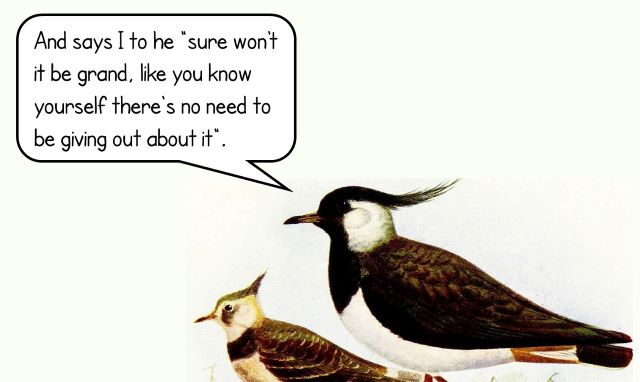About the picture
The sentence in the picture was created with the excellent help of Irish Redditors on r/askireland. The thread is full of other great examples of Irish English. Translated to my own English English, it means “And so I said to him “it will all be alright, you know, there’s no need to complain about it”.
(Bird: The northern lapwing was declared the Republic of Ireland’s national bird by a committee of the Irish Wildlife Conservancy in 1990.)
General resources
Wikipedia page on Hiberno English
Oxford English Dictionary page on Irish English
Academic chapter: Irish as a world English (available in full)
Accent recordings from the 1950s to the present
Some key characteristics
This is by no means a full list. It is just meant to pique the reader’s interest.
- Unmarked plurality (i.e. no “s”) in nouns indicating time and measure: “two mile,” “five year.”
- Direct borrowings from Irish Gaelic such as after: “I’m after going to the shop” (= I have already gone to the shop)
- several forms of a second person plural pronoun, such as youse, ye, and yeez.
Articles
Here are all the articles about Irish English that have appeared in my newsletter English in Progress about world Englishes and English language change
Underlined words are links to articles (this is also true of the “Irish slang” words)
June 2023
Is American English taking over in Ireland?
More and more Irish people are calling their mammy “mom” and they are “reaching out” to each other via email. Language writer Stan Carey is the voice of reason: “the effect is modest compared with how much people’s language is shaped by their family and peers. We just notice it more when it differs from our own or from traditional norms.”
Reading time: 4 minutes / The Independent (Ireland; archived)
PHD thesis: Cohesive Relations across English Varieties; a systemic functional linguistics perspective
Looks at British English, Irish English, Philippine English, and Eastern African English. Conversational registers use more co-reference in all four regional varieties, while academic registers use more lexical cohesion.
May 2023
runners – Irish (Hiberno) English for sneakers
April 2023
A love-letter to Northern Irish slang
The Belfast Telegraph interviews three experts on their love for Northern Irish slang. Because the article was written for locals, they do not actually explain any of the slang.
Reading time: 9 minutes / Belfast Telegraph (Northern Ireland)
How the accents on Irish radio and TV ads have changed
Lecturer in Applied Linguistics Dr Joan O’Sullivan summarises her research on Irish broadcast accents from the 1970s to today. Audio clips in article.
Reading time: 4 minutes / RTE (Ireland)
February 2023
Looper – Irish English for crazy person
January 2023
The Latvian prime minister has an Irish accent when he speaks English. A journalist conjectures the reason is that he sat beside, and was friends with, an Irishman in the European Parliament for 10 years.
Stan Carey teaches us 10 Irish-English words and phrases, among them culchie (someone from the Irish countryside), codding (joking or fooling) and bold (naughty, mischievous).
December 2022
Here’s an article on why Irish people never say what they mean.
November 2022
Linguist Elaine Vaughan has written a piece about the characteristics of Irish English, which she studies professionally.

Heddwen Newton is an English teacher and translator. She is fascinated by contemporary English and the way English changes. Her newsletter is English in Progress. More than 2300 subscribers and growing every day!
